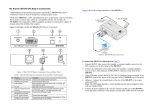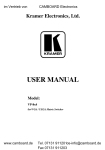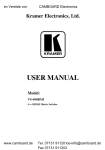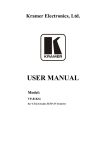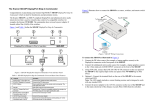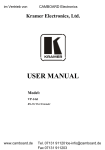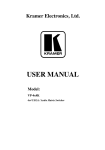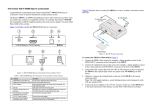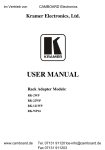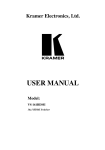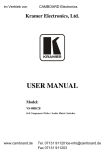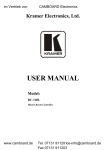Download kramer-vp-81sid 6426KB Feb 07 2014 06:28:25 AM
Transcript
im Vertrieb von CAMBOARD Electronics Kramer Electronics, Ltd. USER MANUAL Model: VP-81SID www.camboard.de Tel. 07131 [email protected] Fax 07131 911203 im Vertrieb von 1 2 2.1 3 3.1 3.2 3.3 3.4 3.5 4 4.1 5 6 6.1 6.2 6.3 6.4 6.5 7 7.1 7.2 7.3 7.4 7.5 7.6 7.7 7.8 8 8.1 9 9.1 9.2 9.3 9.4 9.5 10 11 12 13 CAMBOARD Electronics Contents Introduction Getting Started Quick Start Overview Defining EDID About HDMI—General Description About HDCP—General Description About the Power Connect™ Feature Using Twisted Pair Cable Defining the VP-81SID 8x1 Digital STEP-IN Switcher Using the IR Transmitter for the VP-81SID Installing in a Rack Connecting the VP-81SID 8x1 Digital STEP-IN Switcher Connecting to a Balanced Audio Acceptor Connecting Remote Contact Input and Output Selection Switches Connecting to the VP-81SID via the RS-232 Port Connecting to the VP-81SID via the RS-485 Port Connecting to the VP-81SID via the Ethernet Port Operating the VP-81SID Locally via the Front Panel Buttons Selecting an Input Muting the Input when using Step-In Commanders Resetting all Input Priorities to the Default Selecting an Output Setting the Audio Output Volume Locking and Unlock the Front Panel Buttons Muting the Audio Muting the Audio on an Active Input. Operating the VP-81SID Remotely VP-81SID Step-In Controller Software Operating the VP-81SID Remotely via the Embedded Web Pages To Log On to the VP-81SID Web Pages The VP-81SID Panel Page The VP-81SID Audio Volume Page The VP-81SID Priority Page The VP-81SID Settings Page Wiring the TP RJ-45 Connectors Technical Specifications Default Communication Parameters Default EDID www.camboard.de 1 1 1 3 4 4 5 5 5 6 9 10 11 12 12 14 14 16 18 18 18 18 19 19 19 19 19 20 20 29 29 31 33 33 34 35 36 37 37 i Tel. 07131 [email protected] Fax 07131 911203 im Vertrieb von 14 14.1 14.2 14.3 14.4 14.5 14.6 14.7 14.8 14.9 14.10 14.11 14.12 CAMBOARD Electronics Contents Protocol 3000 Syntax Host Message Format Simple Command Command String Device Message Format Device Long Response Command Terms Entering Commands Bi-directional definition Command Forms Command Chaining Maximum String Length Backward Support Figures Figure 1: VP-81SID 8x1 Digital STEP-IN Switcher Front Panel Figure 2: VP-81SID 8x1 Digital STEP-IN Switcher Rear Panel Figure 3: Connecting the VP-81SID 8x1 Digital STEP-IN Switcher Figure 4: Balanced Stereo Audio Output Connection Figure 5: Remote Input Selection Switch Wiring Figure 6: RS-485 Termination DIP-switch Figure 7: Control of Multiple VP-81SID Devices via RS-232 and RS-485 Figure 8: Local Area Connection Properties Window Figure 9: Internet Protocol (TCP/IP) Properties Window Figure 10: Step-In Software Main Window Figure 11: Typical Input Button Figure 12: Log In Window Figure 13: Connection Method Window Figure 14: Input Selection Figure 15: SID-X1 Input Selection Figure 16: Changing the Output Volume Figure 17: Input Button Properties Window Figure 18: Java Test Page Success Message Figure 19: The Loading Page Figure 20: First Time Security Warning Figure 21: VP-81SID Panel Page Figure 22: Logging In Figure 23: Selecting an Input Figure 24: Selecting an Output Figure 25: Locking the Front Panel Buttons Figure 26: VP-81SID Audio Volume Page Figure 27: VP-81SID Priority Page Figure 28: VP-81SID Settings Page Figure 29: TP Pinout Wiring ii www.camboard.de 41 41 41 41 41 41 42 42 43 43 43 43 43 6 7 11 12 13 15 16 17 17 21 22 23 24 24 25 26 27 29 30 30 31 32 32 32 33 33 33 34 35 KRAMER: SIMPLE CREATIVE TECHNOLOGY Tel. 07131 911201 [email protected] Fax 07131 911203 im Vertrieb von Tables CAMBOARD Electronics Contents Table 1: VP-81SID 8x1 Digital STEP-IN Switcher Front Panel Features Table 2: VP-81SID 8x1 Digital STEP-IN Switcher Rear Panel Features Table 3: Remote Contact Terminal Block Connections Table 4: Main Window Features Table 5: Button Characteristics Table 6: Menu Bar Options Table 7: VP-81SID Panel Page Features Table 8: VP-81SID Settings Page Features Table 9: TP PINOUT Table 10: Technical Specifications of the VP-81SID Table 11: Communication Parameters Table 12: Communication Commands www.camboard.de 6 7 13 21 22 23 31 34 35 36 37 43 iii Tel. 07131 [email protected] Fax 07131 911203 im Vertrieb von 1 CAMBOARD Electronics Introduction Introduction Welcome to Kramer Electronics! Since 1981, Kramer Electronics has been providing a world of unique, creative, and affordable solutions to the vast range of problems that confront the video, audio, presentation, and broadcasting professional on a daily basis. In recent years, we have redesigned and upgraded most of our line, making the best even better! Our 1,000-plus different models now appear in 11 groups1 that are clearly defined by function. Congratulations on purchasing your Kramer VP-81SID 8x1 Digital STEP-IN Switcher. The VP-81SID is ideal for: • Display systems requiring simple input selection • Remote monitoring of computer activity in schools and businesses • Rental/staging applications • Multimedia and presentation source selection The package includes the following items: • VP-81SID 8x1 Digital STEP-IN Switcher • Power cord • Infrared RC-IR3 remote control transmitter (including the required battery and a separate user manual2) • This user manual2 2 Getting Started We recommend that you: • Unpack the equipment carefully and save the original box and packaging materials for possible future shipment • Review the contents of this user manual • Use Kramer high performance high resolution cables3 2.1 Quick Start This quick start chart summarizes the basic setup and operation steps. 1 GROUP 1: Distribution Amplifiers; GROUP 2: Switchers and Routers; GROUP 3: Control Systems; GROUP 4: Format/Standards Converters; GROUP 5: Range Extenders and Repeaters; GROUP 6: Specialty AV Products; GROUP 7: Scan Converters and Scalers; GROUP 8: Cables and Connectors; GROUP 9: Room Connectivity; GROUP 10: Accessories and Rack Adapters; GROUP 11: Sierra Products 2 Download up-to-date Kramer user manuals from http://www.kramerelectronics.com 3 The complete list of Kramer cables is available from http://www.kramerelectronics.com www.camboard.de 1 Tel. 07131 [email protected] Fax 07131 911203 im Vertrieb von 2 www.camboard.de CAMBOARD Electronics Getting Started SIMPLE CREATIVE TECHNOLOGY Tel. 07131 911201KRAMER: [email protected] Fax 07131 911203 im Vertrieb von 3 CAMBOARD Electronics Overview Overview The VP-81SID can route one of eight TP (Twisted Pair), a DVI or an HDMI input to either a TP or an HDMI output. Input selection can also be controlled remotely; • Using Step-In modules (for example, the SID-DP) • Contact closure switches • A serial controller via RS-232 or RS-485 • A PC via Ethernet connected over a LAN The device also outputs balanced and unbalanced stereo audio, as well as digital audio. In particular, the VP-81SID: • Has a bandwidth of 1.65Gbps per video channel • Can be cascaded with up to four VP-81SID devices via the HDMI port to provide up to 37 Twisted Pair inputs • Supports the SID range of Step-in Commander panels for remote inputs and remote step-in control • Has a USB power port that can provide power to USB devices, (for example, the Kramer KW-11T) • Is HDCP compliant • Provides EDID capture – Copies and stores the EDID from a display device You can control the VP-81SID using the front panel buttons, or remotely via: • RS-485 or RS-232 serial commands transmitted by a touch screen system, PC or other serial controller • Ethernet over a LAN • The Kramer RC-IR3 Infrared Remote Control Transmitter or the C-A35M/IRR-50 infrared remote extension cable transmitter (optional) To achieve the best performance: • Connect only good quality connection cables, thus avoiding interference, deterioration in signal quality due to poor matching, and elevated noise levels (often associated with low quality cables) • Avoid interference from neighboring electrical appliances that may adversely influence signal quality and position your VP-81SID away from moisture, excessive sunlight and dust www.camboard.de 3 Tel. 07131 [email protected] Fax 07131 911203 im Vertrieb von CAMBOARD Electronics Overview 3.1 Defining EDID The Extended Display Identification Data (EDID1) is a data-structure, provided by a display that describes its capabilities to a graphics card (that is connected to the display’s source). The EDID enables the PC or laptop to “know” what kind of monitor is connected to the output. The EDID includes the manufacturer’s name, product type, timing data supported by the display, display size, luminance data and (for digital displays only) pixel mapping data. 3.2 About HDMI—General Description High-Definition Multimedia Interface (HDMI) is an uncompressed all-digital2 audio/video interface, widely supported in the entertainment and home cinema industry. It delivers the highest high-definition image and sound quality. Note that Kramer Electronics Limited is an HDMI Adopter and an HDCP Licensee. In particular, HDMI3: • Provides a simple4 interface between any audio/video source, such as a settop box, DVD player, or A/V receiver and video monitor, such as a digital flat LCD / plasma television (DTV), over a single lengthy5 cable • Supports standard, enhanced, high-definition video, and multi-channel digital audio6 on a single cable • Transmits all ATSC HDTV standards and supports 8-channel digital audio, with bandwidth to spare to accommodate future enhancements and requirements • Benefits consumers by providing superior, uncompressed digital video quality via a single cable7, and user-friendly connector • Is backward-compatible with DVI (Digital Visual Interface) • Supports two-way CEC communication between the video source (such as a DVD player) and the digital television, enabling new functionality such as automatic configuration and one-button play 1 Defined by a standard published by the Video Electronics Standards Association (VESA) 2 Ensuring an all-digital rendering of video without the losses associated with analog interfaces and their unnecessary digital-to-analog conversions 3 HDMI, the HDMI logo and High-Definition Multimedia Interface are trademarks or registered trademarks of HDMI licensing LLC 4 With video and multi-channel audio combined into a single cable, the cost, complexity, and confusion of multiple cables currently used in A/V systems is reduced 5 HDMI technology has been designed to use standard copper cable construction at up to 15m 6 HDMI supports multiple audio formats, from standard stereo to multi-channel surround-sound. HDMI has the capacity to support Dolby 5.1 audio and high-resolution audio formats 7 HDMI provides the quality and functionality of a digital interface while also supporting uncompressed video formats in a simple, costeffective manner 4 www.camboard.de SIMPLE CREATIVE TECHNOLOGY Tel. 07131 911201KRAMER: [email protected] Fax 07131 911203 im Vertrieb von CAMBOARD Electronics Overview • HDMI has the capacity to support existing high-definition video formats (720p, 1080i, and 1080p, 2K and 4K), standard definition formats such as NTSC or PAL, as well as 480p and 576p. 3.3 About HDCP—General Description The High-Bandwidth Digital Content Protection (HDCP) standard developed by Intel, protects digital video and audio signals transmitted over DVI or HDMI connections between two HDCP-enabled devices to eliminate the reproduction of copyrighted material. To protect copyright holders (such as movie studios) from having their programs copied and shared, the HDCP standard provides for the secure and encrypted transmission of digital signals. 3.4 About the Power Connect™ Feature The Power Connect™ feature here means that digital Step-In Commanders (for example, the SID-DP and SID-DVI) do not require an independent power supply if the distance between the VP-81SID and the Step-In Commander does not exceed 50m (164ft). The Power Connect™ feature applies as long as the cable can carry power. For longer distances heavy gauge cable or a power adapter should be used. Note: Analog Step-In Commanders (for example, the SID-VGA and SID-X1) do require independent power supplies. 3.5 Using Twisted Pair Cable Kramer engineers have developed special twisted pair cables to best match our digital twisted pair products; the Kramer BC-DGKat623 (CAT 6 23 AWG cable), and the Kramer BC-DGKat7a23 (CAT 7a 23 AWG cable). These specially built cables significantly outperform regular CAT 6/CAT 7a cables. In applications where plenum cable is required, use the Kramer BCP-DGKat724 (CAT 7 23 AWG cable). www.camboard.de 5 Tel. 07131 [email protected] Fax 07131 911203 im Vertrieb von 4 CAMBOARD Electronics Defining the VP-81SID 8x1 Digital STEP-IN Switcher Defining the VP-81SID 8x1 Digital STEP-IN Switcher Figure 1 and Table 1 define the front panel of the VP-81SID 8x1 Digital STEP-IN Switcher. Figure 1: VP-81SID 8x1 Digital STEP-IN Switcher Front Panel Table 1: VP-81SID 8x1 Digital STEP-IN Switcher Front Panel Features # 1 2 3 4 5 6 7 8 9 10 Feature Function LED IR Sensor POWER LED TP INPUT SELECT Buttons (1 to 8) LOCAL INPUT SELECT Buttons OUTPUT SELECT Buttons VOLUME CONTROL Buttons DVI HDMI HDMI TP + – Lights yellow when receiving an IR signal Receives the signal transmitted by an IR remote control Lights green when the device is powered on Press to select one of the TP inputs Press to select the DVI input Press to select the HDMI input Press to select the HDMI output Press to select the TP output Press to increase the analog audio output volume Press to decrease the analog audio output volume 11 MUTE Button Press to mute the external audio output 12 LOCK Button Press and hold to lock the front panel buttons. Press and hold again to unlock the buttons 6 www.camboard.de Tel. 07131 911201 Fax 07131 911203 [email protected] KRAMER: SIMPLE CREATIVE TECHNOLOGY im Vertrieb von CAMBOARD Electronics Defining the VP-81SID 8x1 Digital STEP-IN Switcher Figure 2 and Table 2 define the rear panel of the VP-81SID 8x1 Digital STEP-IN Switcher. Figure 2: VP-81SID 8x1 Digital STEP-IN Switcher Rear Panel Table 2: VP-81SID 8x1 Digital STEP-IN Switcher Rear Panel Features # 1 2 3 4 5 6 7 8 9 10 11 Feature TP Input RJ-45 Connectors IN 1 to IN 8 LOCAL INPUTS DVI HDMI TP OUT RJ-45 Connector USB POWER Connector RS-232 9-pin D-sub Port (F) REMOTE 12-way Terminal Block ETHERNET RJ-45 Connector AC Mains Power Socket AC Mains Fuse AC Mains Power Switch www.camboard.de Function Connect to the remote TP sources (1 to 8) using CAT 6 or higher specification cable. These may be step-in panels (for example, SID-DP) or TP transmitters (for example, the PT-571 or TP-573) Connect to the local DVI source Connect to the local HDMI source Connect to the remote TP receiver, for example, PT-572+, using CAT 6 or higher specification cable (maximum 50m, 164ft) Connect any device requiring USB power, (for example, the Kramer KW-11T) Connect to a serial controller (see Section 6.3) Connect to remote contact closure input and output selection switches (see Section 6.2) Connect to a PC or LAN for remote control via Ethernet (see Section 6.5) Connect to the AC mains power AC mains supply protection fuse Turns the AC mains power supply to the device on and off Tel. 07131 911201 Fax 07131 911203 7 [email protected] im Vertrieb von CAMBOARD Electronics Defining the VP-81SID 8x1 Digital STEP-IN Switcher # 12 13 14 15 16 17 18 19 Feature LOCAL AUDIO INPUTS Function DVI HDMI HDMI OUT Connector AUDIO OUTPUTS +L–G+R– L R S/PDIF PROG TERM DIP-Switch 20 RS-485 3-way Terminal Block 21 22 RESET Button REMOTE IR 3.5mm Mini Jack 8 www.camboard.de Connect to the local DVI audio source Connect to the local HDMI audio source Connect to the local HDMI acceptor Connect to the balanced audio acceptor (see Section 6.1) Connect to the unbalanced audio acceptor left channel Connect to the unbalanced audio acceptor right channel Connect to the digital audio acceptor DIP-Switch 1: Sets the RS-485 bus termination (see Section 6.4.2) Up = Off, Down = On. Default = On DIP-Switch 2: For the use of Kramer service personnel only Connect to RS-485 port on a remote controller or another VP-81SID. Connect: G to Ground, A to A, and B to B (see Section 6.4) Press while power-cycling the device to reset parameters to factory default values Connect to an external IR receiver unit for controlling the device via an IR remote controller (see Section 4.1) Tel. 07131 911201 Fax 07131 911203 [email protected] KRAMER: SIMPLE CREATIVE TECHNOLOGY im Vertrieb von Defining theCAMBOARD Electronics VP-81SID 8x1 Digital STEP-IN Switcher 4.1 Using the IR Transmitter for the VP-81SID You can use the RC-IR3 IR transmitter to operate the VP-81SID via the built-in IR receiver on the front panel or, instead, via an optional external IR receiver1. The external IR receiver can be located 15m (49ft) away from the device. This distance can be extended to up to 60m (197ft) when used with three extension cables2. Before using the external IR receiver, be sure to arrange for your Kramer dealer to insert the internal IR connection cable3 with the 3.5mm mini jack that fits into the REMOTE IR opening on the rear panel. Connect the external IR receiver to the REMOTE IR 3.5mm mini jack. 1 Model: C-A35M/IRR-50 2 Model: C-A35M/A35F-50 3 P/N: 505-70434010-S www.camboard.de 9 Tel. 07131 [email protected] Fax 07131 911203 im Vertrieb von 5 CAMBOARD Electronics Installing in a Rack Installing in a Rack This section describes the preparation and installation of the unit in a rack. 10 www.camboard.de SIMPLE CREATIVE TECHNOLOGY Tel. 07131 911201KRAMER: [email protected] Fax 07131 911203 im Vertrieb vonConnecting theCAMBOARD Electronics VP-81SID 8x1 Digital STEP-IN Switcher 6 Connecting the VP-81SID 8x1 Digital STEP-IN Switcher Figure 3: Connecting the VP-81SID 8x1 Digital STEP-IN Switcher To connect1 the VP-81SID, as illustrated in the example in Figure 3: 1. Connect up to eight2 remote Step-in Commanders3 (for example, the SID-H and SID-DVI Step-In Commander panels up to 50m (164ft) away) or TP transmitters (for example, the PT-571 and TP-573) to the VP-81SID RJ-45 TP INPUT connectors. 2. Connect a DVI video source (for example, a computer graphics source) to the LOCAL INPUTS DVI connector, and the computer’s unbalanced stereo audio source to the LOCAL AUDIO INPUT DVI connector. 3. Connect an HDMI video source to the LOCAL INPUTS HDMI connector. 1 Be sure that the power is switched off to each device before connecting it to your VP-81SID. After connecting all the devices to your VP-81SID, switch on the power to the VP-81SID, and then switch on the power to each device 2 You do not have to connect all the inputs 3 Any combination of Step-In panels and TP transmitters up to a maximum of eight www.camboard.de 11 Tel. 07131 [email protected] Fax 07131 911203 im Vertrieb vonConnecting theCAMBOARD Electronics VP-81SID 8x1 Digital STEP-IN Switcher 4. Connect the TP OUT RJ-45 connector to a compatible TP receiver up to 50m (164ft), for example, PT-572+. 5. Connect the S/PDIF RCA digital audio output to an audio acceptor (for example, a DAT recorder). 6. Connect the balanced audio 5-pin terminal block (see Section 6.1) to an audio acceptor (for example, a balanced stereo audio amplifier). 7. Optional—Connect up to ten remote, contact closure input selection switches to the REMOTE terminal block (see Section 6.2). 8. Optional—Connect the Ethernet RJ-45 TP port directly or via a LAN to a PC controller. Alternatively, you can connect a PC and/or controller to the: RS-232 port (see Section 6.3) RS-485 port (see Section 6.4) 9. Connect the power cord1. Note: When signal sources are disconnected from inputs, signal acceptors (for example, a projector) may not go into standby mode automatically. We therefore recommend that you turn off the VP-81SID and/or the acceptor. Note: When using the PT-572+ in conjunction with the VP-81SID do not connect the 12V power supply to the PT-572+. 6.1 Connecting to a Balanced Audio Acceptor Figure 4 illustrates how to wire devices to the balanced audio output. Figure 4: Balanced Stereo Audio Output Connection 6.2 Connecting Remote Contact Input and Output Selection Switches You can connect remote, contact closure input selection switches to the REMOTE terminal block on the rear panel of the VP-81SID. Remote input selection switches provide the ability to remotely activate the inputs and an output. Table 3 lists the remote contact terminal block connections. 1 We recommend that you use only the power cord that is supplied with the device 12 www.camboard.de SIMPLE CREATIVE TECHNOLOGY Tel. 07131 911201KRAMER: [email protected] Fax 07131 911203 im Vertrieb vonConnecting theCAMBOARD Electronics VP-81SID 8x1 Digital STEP-IN Switcher Table 3: Remote Contact Terminal Block Connections Terminal Number 1 2 3 4 5 6 7 8 9 10 11 G Description Connect to ground to select input 1 Connect to ground to select input 2 Connect to ground to select input 3 Connect to ground to select input 4 Connect to ground to select input 5 Connect to ground to select input 6 Connect to ground to select input 7 Connect to ground to select input 8 Connect to ground to select input 9 Connect to ground to select input 10 Connect to ground to toggle between output 1 and output 2 Ground The following example (see Figure 5) illustrates three switches (1, 8 and A) connected so as to remotely control inputs 1 and 8, and select an output respectively. Connected as shown, pressing switch 1 causes input 1 on the VP-81SID to be the active input, and pressing switch 8 causes input 8 to be the active input. Pressing switch A causes the output selection to toggle between the TP and HDMI outputs. Figure 5: Remote Input Selection Switch Wiring To connect remote input/output selection switches as illustrated in the example in Figure 5: 1. Connect Switch 1 to pins 1 and G on the terminal block (remote step-in for input 1). 2. Connect Switch 8 to pins 8 and G on the terminal block (remote step-in for input 8). 3. Connect Switch A to pins 11 and G on the terminal block (remote output selection toggle). www.camboard.de 13 Tel. 07131 [email protected] Fax 07131 911203 im Vertrieb vonConnecting theCAMBOARD Electronics VP-81SID 8x1 Digital STEP-IN Switcher 6.3 Connecting to the VP-81SID via the RS-232 Port You can connect to the VP-81SID via an RS-232 connection using, for example, a PC (see Section 12). Note that a null-modem adapter/connection is not required. To connect to the VP-81SID via RS-232: • Connect the RS-232 9-pin D-sub rear panel port on the VP-81SID unit via a 9-wire straight cable (only pin 2 to pin 2, pin 3 to pin 3, and pin 5 to pin 5 need to be connected) to the RS-232 9-pin D-sub port on your PC 6.4 Connecting to the VP-81SID via the RS-485 Port You can operate the VP-81SID via the RS-485 port from a distance of up to 1200m (3900ft) using any device equipped with an RS-485 port (for example, a PC). For successful communication, you must set the RS-485 machine number and bus termination. To connect a device with a RS-485 port to the VP-81SID: 1. Connect the TxD+ pin on the RS-485 port of the PC to the A pin on the RS-485 port on the rear panel of the VP-81SID. 2. Connect the TxD– pin on the RS-485 port of the PC to the B pin on the RS-485 port on the rear panel of the VP-81SID. 3. If shielded TP cable is used, the shield may be connected to the G (ground) pin on the unit. 6.4.1 Setting the RS-485 Machine Number The machine number on the RS-485 bus can be set to between 1 and 4 and can be set using the front panel buttons. To set the RS-485 machine number using the front panel buttons: 1. Press the Lock button until the button lights. The front panel buttons are locked. 2. Press the Local Input Select HDMI and Mute buttons at the same time. The TP Input Select buttons flash. 3. Press the TP Input Select button number (1 to 4) for the required machine number. The TP Input Select buttons stop flashing and the selected TP Input Select button lights. 4. Press the Lock button until the button is no longer lit. The selected machine number is set and front panel buttons are unlocked. 14 www.camboard.de SIMPLE CREATIVE TECHNOLOGY Tel. 07131 911201KRAMER: [email protected] Fax 07131 911203 im Vertrieb vonConnecting theCAMBOARD Electronics VP-81SID 8x1 Digital STEP-IN Switcher 6.4.2 Setting the RS-485 Bus Termination Figure 6 illustrates the factory default DIP-switch positions. Figure 6: RS-485 Termination DIP-switch DIP-switch 1 sets the RS-485 bus termination of the VP-81SID. Only the first and last physical units on the RS-485 bus must be terminated, all others must be unterminated. Moving the DIP-switch up turns the termination off (default), moving the switch down enables the termination. 6.4.3 Connecting and Controlling Multiple VP-81SID Devices You can connect up to four VP-81SID devices with operation via RS-232 (as shown in the example in Figure 7) or Ethernet. Connecting four devices provides 37 inputs. To connect up to four VP-81SID devices: 1. Connect the RS-232 port1 on the first VP-81SID device to the PC (see Section 6.3). 2. Connect the RS-485 terminal block port on the first device to the RS-485 port on the second device, and so on for all devices. (Connect A to A, B to B, and G to G.) 3. Connect the HDMI LOCAL INPUT on the first device to the HDMI OUT on the second device, and so on for all devices. 4. Set the machine number and termination as follows: The first device is machine number 1 and the subsequent three devices are machine numbers 2 to 4 (see Section 6.4.1) Terminate the first and last devices, that is, terminate machine numbers 1 and 4 (see Section 6.4.2). Ensure that all other devices are left unterminated 1 Alternatively, the RS-485 port could be used for PC control www.camboard.de 15 Tel. 07131 [email protected] Fax 07131 911203 im Vertrieb vonConnecting theCAMBOARD Electronics VP-81SID 8x1 Digital STEP-IN Switcher Figure 7: Control of Multiple VP-81SID Devices via RS-232 and RS-485 6.5 Connecting to the VP-81SID via the Ethernet Port You can connect the VP-81SID via Ethernet in the following ways: • For direct connection to the PC, use a crossover cable (see Section 6.5.1) • For connection via a network hub or network router, use a straight through cable (see Section 6.5.2) Note: The following instructions are valid only if your PC uses a fixed IP address. If your PC receives an IP address from a DHCP server, consult your IT department regarding a suitable IP address. 6.5.1 Connecting Directly to the Ethernet Port You can connect the Ethernet port of the VP-81SID to the Ethernet port on your PC via a crossover cable with RJ-45 connectors. This type of connection is recommended for identification of the factory default IP address of the VP-81SID during the initial configuration To connect the VP-81SID directly to a PC: 1. Using a crossover cable, connect the VP-81SID to the PC via the Ethernet port on both units. 2. On the PC, click Start > Control Panel. 16 www.camboard.de SIMPLE CREATIVE TECHNOLOGY Tel. 07131 911201KRAMER: [email protected] Fax 07131 911203 im Vertrieb vonConnecting theCAMBOARD Electronics VP-81SID 8x1 Digital STEP-IN Switcher 3. Double-click Network Connections. 4. Right-click, and from the menu select Properties. The Local Area Connection Properties window appears. Figure 8: Local Area Connection Properties Window 5. Select Internet Protocol (TCP/IP) (see Figure 8). 6. Click the Properties button. 7. Select Use the following IP address, and fill in the details as shown in Figure 9. You can use any IP address in the range 192.168.1.1 to 192.168.1.255 (excluding 192.168.1.39) that is provided by your IT department. Figure 9: Internet Protocol (TCP/IP) Properties Window www.camboard.de 17 Tel. 07131 [email protected] Fax 07131 911203 im Vertrieb von CAMBOARD Electronics Operating the VP-81SID Locally via the Front Panel Buttons 8. Click OK. 6.5.2 Connecting via a Network Hub, Switch, or Router You can connect the Ethernet port of the VP-81SID to the Ethernet port on a network hub, switch, or router, via a straight through cable with RJ-45 connectors. The VP-81SID Ethernet port has to be configured to be compatible with your network (see Section 8.1.13). 7 Operating the VP-81SID Locally via the Front Panel Buttons Powering up the VP-81SID recalls the last settings (that is, the configuration of the device when it was powered down) from the non-volatile memory. 7.1 Selecting an Input The input buttons illuminate to indicate the following: • Off indicates the input is not selected • On indicates the input is selected • Flashing indicates that you have tried to select the input but another input with a higher priority is currently selected To select an input: • Press one of the ten front panel Input Select buttons. The selected button lights Note: Pressing an active input button mutes the input. Pressing the button again unmutes the input. Note: The priority of each input can be set individually using the Step-In Commander panel. 7.2 Muting the Input when using Step-In Commanders To mute and unmute the input when using a Step-In Commander: 1. Press the Input Select button on the Step-In Commander. The input is selected and the buttons lights. 2. Press the Step In button on the Step-In Commander. The input is muted and the button no longer lights. 3. Press the Step In button on the Step-In Commander a second time. The input is unmuted and the button lights. 7.3 Resetting all Input Priorities to the Default To reset all input priorities to the default priority (10): 1. Press the Lock button until the button lights. The front panel buttons are locked. 18 www.camboard.de SIMPLE CREATIVE TECHNOLOGY Tel. 07131 911201KRAMER: [email protected] Fax 07131 911203 im Vertrieb von CAMBOARD Electronics Operating the VP-81SID Locally via the Front Panel Buttons 2. Press the Volume Control + and – buttons at the same time. All the TP Input Select buttons flash. When they stop flashing, the input priorities have been reset to their defaults. 7.4 Selecting an Output To select an output: • Press one of the two front panel Output Select buttons. The selected button lights. 7.5 Setting the Audio Output Volume To set the audio output volume: • Press either the Volume Control + (to increase the volume) or the Volume Control – (to decrease the volume) button. To mute the audio output: • Press the Mute button. The button lights and the audio is muted. 7.6 Locking and Unlock the Front Panel Buttons To lock and unlock the front panel buttons: 1. Press the Lock button until it lights. The front panel buttons are locked. 2. Press the Lock button until it no longer lights. The front panel buttons are unlocked. 7.7 Muting the Audio To mute and unmute the audio on an input: 1. Press the Mute button on the front panel of the VP-81SID. The audio is muted and the button lights. 2. Press the Mute button on the front panel of the VP-81SID a second time. The audio is unmuted and the button no longer lights. 7.8 Muting the Audio on an Active Input. To mute and unmute the audio on an active input: 1. Press the Input button of the active input. The button flashes and the input is muted. 2. Press the Input button a second time. The input is unmuted and the button lights. www.camboard.de 19 Tel. 07131 [email protected] Fax 07131 911203 im Vertrieb von 8 CAMBOARD Electronics Operating the VP-81SID Remotely Operating the VP-81SID Remotely The VP-81SID can be operated remotely via any of the following methods: • The Step-in Controller software (see Section 8.1) • Step-In Commander panels • Contact closure switches (for connecting, see Section 6.2) • RS-485 (for connecting, see Section 6.4) or RS-232 (for connecting, see Section 6.3) serial commands transmitted by a touch screen system, PC or other serial controller • Ethernet over a LAN (for connecting, see Section 6.5) • Remotely using the Kramer RC-IR3 Infrared Remote Control Transmitter (refer to the RC-IR3 user manual) or the infrared remote extension cable transmitter • The embedded Web pages (see Section 9) 8.1 VP-81SID Step-In Controller Software The Step-In Software requires the following: • Windows™ XP, Vista or Windows™ 7 • Microsoft .Net Framework version 3 To install the Step-In Software, download the software and run the setup file. After installation, running the Step-In Software for the first time displays a window similar to that shown in Figure 10. The VP-81SID can operate in either the secure mode or the unsecure mode. The factory default mode is unsecure. To change the mode, see Section 14.12.33. In the secure mode, access can be via either Admin or User (see Section 8.1.1). When in unsecure mode, full access is granted without Admin authorization. 20 www.camboard.de SIMPLE CREATIVE TECHNOLOGY Tel. 07131 911201KRAMER: [email protected] Fax 07131 911203 im Vertrieb von CAMBOARD Electronics Operating the VP-81SID Remotely Figure 10: Step-In Software Main Window Table 4: Main Window Features # 1 2 3 Feature Function 4 5 6 Connect/Disconnect Button Selected Input Buttons Device 2 Cascaded Device(s) Current User Label Log In Button Inputs Twisted Pair Buttons 7 Local Input Buttons 8 Outputs Buttons 9 Output Volume Slider 10 Mute on/off Button www.camboard.de Click to connect to or disconnect from the device (see Section 8.1.4) Click to select an input. The selected input button is highlighted Inputs of any cascaded devices Indicates which user is currently logged in (see Section 8.1.3) Click to log in (see Section 8.1.3) Click one of the eight remote Twisted Pair input buttons to select an input (see Section 6.3) Click one of the two local input buttons to select an input (see Section 6.3) Click one of the two output buttons to select an output (see Section 8.1.5) Click, hold and move the slider up (higher) or down (lower) to adjust the output volume (see Section 6.3) Click to mute/unmute the output volume (see Section 8.1.7) 21 Tel. 07131 [email protected] Fax 07131 911203 im Vertrieb von CAMBOARD Electronics Operating the VP-81SID Remotely Note: When a change is made on the device (for example, a different output is selected), the change is reflected almost immediately in the main window of the Step-in Software, and visa versa. Figure 11 shows a typical input button. Figure 11: Typical Input Button Table 5: Button Characteristics # 1 2 3 Feature 10 HDMI Label Status ACTIVE 4 5 6 7 HDMI 1280x720p@60 Priority 10 Slider Description Input (1–10) or output (1–2) channel number User-selectable button label, Admin only (see Section 6.3) Indicates the status of the connection and signal on the channel: TIMEOUT—no cable MUTE— cable present, no signal detected WAIT— cable and signal present but channel is not selected ACTIVE—cable and signal present and channel is selected (only one channel at a time) User-selectable icon selected to be displayed on the button, Admin only (see Section 8.1.10) Video input type: VGA, HDMI, DP, DVI Video resolution, i=interlace/p=progressive, refresh rate Slider for adjusting the priority (1, lowest–10, highest) of the input, Admin only (see Section 8.1.5) 8.1.1 Authorized Users By default, you are logged in as User and you can: • Select an active input or output • Adjust or mute/unmute the output volume • Change the device name • Modify the IP configuration Options that you are not authorized to perform are grayed out. When logged in as Admin, in addition to the User abilities, you can: • Modify the input priorities (see Section 8.1.9) • Modify the input/output button characteristics (see Section 8.1.10) • Upgrade the device firmware (see Section 8.1.5) • Reset the device (see Section 8.1.12) 22 www.camboard.de SIMPLE CREATIVE TECHNOLOGY Tel. 07131 911201KRAMER: [email protected] Fax 07131 911203 im Vertrieb von CAMBOARD Electronics Operating the VP-81SID Remotely • Change the User and Admin Passwords • Enable/disable IR control Note: Any actions that you are not authorized to perform are grayed out. 8.1.2 The Step-in Software Menu Bar The menu bar options are shown in Table 6. Table 6: Menu Bar Options Menu Bar Options FILE DEVICE Sub Menu Description Connect/Disconnect Exit Details Change Admin Password Cascade Firmware Update ABOUT Change Unit Password Reset IR Status NA Connect or disconnect to the device Exit the Step-in software Retrieve and display the device details, such as, model, unit name, version, and so on Change the Admin password Select the number of cascaded devices Update the device firmware using a new firmware file (Admin only) Change the Admin user password (Admin only) Power cycle the device (Admin only) Enable or disable the IR control for the device Displays the Step-in Software and Kramer company details 8.1.3 Logging in as Admin To log in as admin: 1. Click the Log In button. The Log In window appears as shown in Figure 12. Figure 12: Log In Window 2. Select either User or Admin using the radio buttons. 3. Enter the password. The main window is displayed and the user shown is Admin. 4. To log out, click Log Out. Note: By default there is no Admin password. To change the Admin password, see Section 9.5. www.camboard.de 23 Tel. 07131 [email protected] Fax 07131 911203 im Vertrieb von CAMBOARD Electronics Operating the VP-81SID Remotely 8.1.4 Connecting to the Device To connect to the device: 1. Click the Connect button. The Connection Method window is displayed as shown in Figure 13. Figure 13: Connection Method Window 2. Select the connection method (via Ethernet over a LAN or a serial connection) by clicking the relevant radio button. 3. For Ethernet, enter the IP address and Port number of the device and click Connect. To set the default IP address and Port number, press the Default button. 4. For a serial connection, select the required Com port from the drop-down list. 5. Click Connect. If the connection is successful, the window shown in Figure 10 appears. If the connection is not successful, a Timeout error message appears. 8.1.5 Switching an Input to an Output To switch an input to an output: 1. Click on the required twisted-pair or local input to switch. The input is selected and the button changes to solid purple as shown in Figure 17. Figure 14: Input Selection 24 www.camboard.de SIMPLE CREATIVE TECHNOLOGY Tel. 07131 911201KRAMER: [email protected] Fax 07131 911203 im Vertrieb von CAMBOARD Electronics Operating the VP-81SID Remotely 2. Click on the required output to select. The switch selection is made and the button changes to solid purple. Note: To switch an input to an output, you can click on either an input or an output first, the order is not important. 8.1.6 Switching and Selecting an Input when using the SID-X1 To switch an input to an output: 1. Click on the TP input to which the SID-X1 is connected. The switch selection is made and the button changes to solid purple. 2. Right-click on the input. The InputPropertiesForm screen is shown as in Figure 15. Figure 15: SID-X1 Input Selection 3. Click on the required Input Type button. The input type selection is made and the button changes to solid purple. 4. Click Save. The Input type is selected on the SID-X1. 8.1.7 Changing the Output Volume To change the output volume: 1. Click and hold on the Output Volume slider as shown in Figure 17. www.camboard.de 25 Tel. 07131 [email protected] Fax 07131 911203 im Vertrieb von CAMBOARD Electronics Operating the VP-81SID Remotely Figure 16: Changing the Output Volume 2. Drag up to increase or down to decrease the output volume. The volume level changes accordingly. 8.1.8 Muting the Audio Output To mute the audio output: 1. Click the Mute button. The button changes to purple and the audio is muted. 2. Click the colored Mute button to unmute the audio. The button changes to white and the audio is unmuted. 8.1.9 Changing the Priority of an Input The priority of an input determines whether another input that is selected can take control from it, where 1 is the lowest and 10 is the highest priority. For example, input 4 has a priority of 2 and input 8 has a priority of 5. If input 8 is currently selected, input 4 cannot take control. In this case, if you press input 4, the button flashes for a few seconds and then goes off, indicating that input 4 is not selected. To change the input priority you must be logged in as Admin. To change the priority of an input: • Click, hold and move the Priority slider on the relevant input to the required priority, right to increase and left to decrease the priority. 8.1.10 Changing the Input and Output Button Icons and Labels To change the input/output button icons and labels you must be logged in as Admin. 26 www.camboard.de SIMPLE CREATIVE TECHNOLOGY Tel. 07131 911201KRAMER: [email protected] Fax 07131 911203 im Vertrieb von CAMBOARD Electronics Operating the VP-81SID Remotely To change an input/output button icon and label: 1. Right-click on the relevant button. The button Input Properties window appears as shown in Figure 17. Figure 17: Input Button Properties Window 2. In the Label text field, enter the required button label. 3. Either: Select the required icon from the list (you can save custom icons in the \Kramer Electronics\StepIn Controller\Images directory) OR Click Select icon from file and browse to the icon directory 4. Click OK. The button characteristics are changed. 8.1.11 Updating the Firmware To update the firmware you must be logged in as Admin. To update the firmware: 1. Download the latest firmware file from http:www.kramerelectronics.com. 2. Click Unit > Firmware Update. 3. Browse to the firmware file that you downloaded. 4. Click Open. The device firmware is loaded. Note: Do not interrupt the uploading process or the device may be damaged. 5. When the process is complete, reset the device (see Section 8.1.12). 8.1.12 Resetting the Device To reset the device you must be logged in as Admin. To reset the device: 1. Click Unit > Reset. www.camboard.de 27 Tel. 07131 [email protected] Fax 07131 911203 im Vertrieb von CAMBOARD Electronics Operating the VP-81SID Remotely 2. Click OK. The device is reset. 8.1.13 Setting the IP Network Parameters To set the IP network parameters you must be logged in as Admin. To set the IP network parameters: 1. Click Unit > Device Details. 2. Under Connectivity, edit the required parameter. 3. Click Set Value. A confirmation message appears. 4. Click OK. The parameter is set. 5. Reset the device (see Section 8.1.13). 8.1.14 Setting Multiple Cascaded Devices You can control up to four devices via a single RS-232 or Ethernet connection using the Step-In Software. Control of multiple devices is the same as for a single device but you must first set the number of devices. The main window (see Figure 10) then displays an extra column of input buttons for each device. The number of devices can be set manually or automatically. We recommend that you set the number of devices manually as the auto-scanning procedure can take some time. To set the number of devices: 1. From the menu bar, click Unit. 2. From the options, click Cascade. 3. Either: Manually select the number of devices OR Select Auto. The Step-In Software scans the RS-485 bus for active devices. This may take a few minutes 8.1.15 Changing the Admin Password By default, there is no Admin password. To change the Admin password, use the embedded Web pages (see Section 9.5). You can only change the Admin password if you are logged in as Admin. 28 www.camboard.de SIMPLE CREATIVE TECHNOLOGY Tel. 07131 911201KRAMER: [email protected] Fax 07131 911203 im Vertrieb von CAMBOARD Electronics Operating the VP-81SID Remotely via the Embedded Web Pages 9 Operating the VP-81SID Remotely via the Embedded Web Pages The embedded Web pages can be used to remotely operate the VP-81SID using a Web browser and an Ethernet connection. Before attempting to connect: • Perform the procedures in Section 6.5. • Ensure that the Java™ software is installed and functioning correctly on your computer. If not, download it from www.java.com • Ensure that your browser is supported—Microsoft IE (V6.0 and higher), Google Chrome, Firefox (V3.0 and higher). To check that Java is installed and running correctly, browse to http://www.java.com/en/download/help/testvm.xml This page runs a test and displays a Java success (see Figure 18) or failure message. Figure 18: Java Test Page Success Message If you do not see the success message, follow the instructions on the page to: • Load and enable Java • Enable Javascript in your browser 9.1 To Log On to the VP-81SID Web Pages To log on to VP-81SID Web pages: 1. Open your Internet browser. 2. Type the unit’s IP number (see Table 11) in the Address bar of your browser. The Loading page appears. www.camboard.de 29 Tel. 07131 [email protected] Fax 07131 911203 im Vertrieb von CAMBOARD Electronics Operating the VP-81SID Remotely via the Embedded Web Pages Figure 19: The Loading Page The first time that you run the program, the Warning-Security screen appears. Figure 20: First Time Security Warning 3. Click Run. The main switching control Home page is displayed which shows a graphical interpretation of the front panel (see Figure 21). The Web pages let you control the VP-81SID via Ethernet over a LAN. There are four Web pages: 30 www.camboard.de SIMPLE CREATIVE TECHNOLOGY Tel. 07131 911201KRAMER: [email protected] Fax 07131 911203 im Vertrieb von CAMBOARD Electronics Operating the VP-81SID Remotely via the Embedded Web Pages • • • • The Panel page (see Section 9.2) The Audio Volume page (see Section 9.3) The Priority page (See Section 9.4) The Settings page (see Section 9.5) 9.2 The VP-81SID Panel Page The VP-81SID Panel page lets you perform operational actions, such as, switching inputs/outputs and locking the front panel buttons. Note: Options that are grayed out indicate insufficient user privileges (see Section 9.2.1). Figure 21: VP-81SID Panel Page Table 7: VP-81SID Panel Page Features # 1 2 3 4 5 6 9.2.1 Feature Page Name Output Radio Buttons (HDMI and Twisted Pair) Input Selection (In 1 to In 10) Currently Selected Input Lock Button Log In/Log Out Button Function Indicates the current page Click to select an output (see Section 9.2.2) Click to select an input (see Section 9.2.2) Indicates the currently selected input Click to lock the front panel buttons (see Section 9.2.4) Click to log on and log out (see Section 9.2.1) Logging In to the Software See Section 8.1.1 for a description of authorized users. When security is disabled (see Section 9.5), no user authentication is performed and all options are available for modification. When security is enabled, authentication is by User or Admin privileges and some options have restricted access. www.camboard.de 31 Tel. 07131 [email protected] Fax 07131 911203 im Vertrieb von CAMBOARD Electronics Operating the VP-81SID Remotely via the Embedded Web Pages Figure 22: Logging In To log in: 1. From the Login as drop-down list, select either User or Admin. 2. In the Password field enter your password. 3. Click Login. 9.2.2 Selecting an Input To select an input: • Click in the square underneath the required Input. The selected input icon is placed in the square and the input becomes active. Figure 23: Selecting an Input 9.2.3 Selecting an Output To select an output: • Click the radio button of the required Output. The selected output becomes active. Figure 24: Selecting an Output 32 www.camboard.de SIMPLE CREATIVE TECHNOLOGY Tel. 07131 911201KRAMER: [email protected] Fax 07131 911203 im Vertrieb von CAMBOARD Electronics Operating the VP-81SID Remotely via the Embedded Web Pages 9.2.4 Locking the Front Panel Buttons To lock the front panel buttons: • Click on the lock icon. The front panel buttons are locked. To unlock the front panel buttons, click on the lock icon again Figure 25: Locking the Front Panel Buttons 9.3 The VP-81SID Audio Volume Page The VP-81SID Audio Volume page lets you adjust the audio output volume. Figure 26: VP-81SID Audio Volume Page To change the volume of the audio output: • Click on the + (to increase) or on the – (to decrease) button of the Output Volume 9.4 The VP-81SID Priority Page The VP-81SID Priority page lets you set the input priority. Figure 27: VP-81SID Priority Page www.camboard.de 33 Tel. 07131 [email protected] Fax 07131 911203 im Vertrieb von CAMBOARD Electronics Operating the VP-81SID Remotely via the Embedded Web Pages To change the priority of an input: • Click on the + (to increase) or on the – (to decrease) button of the input whose priority you want to modify 9.5 The VP-81SID Settings Page The VP-81SID Settings page lets you configure the device configuration settings, such as, device name and IP settings. Note: Throughout this section options that are not available for an unauthorized user are grayed out. Figure 28: VP-81SID Settings Page Table 8: VP-81SID Settings Page Features 1 2 3 4 5 6 7 8 # Feature Name IP Address DHCP Gateway Subnet Mask User Password Admin Password Security 34 www.camboard.de Function The name of the device The IP address of the device Check the box to configure the device to request an IP address from a DHCP server The gateway address of the device The subnet mask of the device The User password of the device The Admin password of the device Check the box to enable User/Admin security SIMPLE CREATIVE TECHNOLOGY Tel. 07131 911201KRAMER: [email protected] Fax 07131 911203 im Vertrieb von 10 CAMBOARD Electronics Wiring the TP RJ-45 Connectors Wiring the TP RJ-45 Connectors Table 9 and Figure 29 define the TP pinout, using a straight pin-to-pin cable with RJ-45 connectors (note that the cable Ground shielding must be connected/soldered to the connector shield). Table 9: TP PINOUT Figure 29: TP Pinout Wiring EIA /TIA 568B 1 2 3 4 5 6 7 8 PIN PIN Orange / White Orange Green / White Blue Blue / White Green Brown / White Brown Pair 1 4 and 5 Pair 2 1 and 2 Pair 3 3 and 6 Pair 4 7 and 8 www.camboard.de 35 Tel. 07131 [email protected] Fax 07131 911203 im Vertrieb von 11 CAMBOARD Electronics Technical Specifications Technical Specifications Table 10 lists the technical specifications1 of the VP-81SID. Table 10: Technical Specifications of the VP-81SID INPUTS: Video: 8 TP on RJ-45 connectors 1 DVI-D, 1.2Vpp on a DVI Molex 24-pin (F) connector; DDC signal 5Vpp (TTL) 1 HDMI connector Audio: 2 Unbalanced stereo audio (1 for DVI and 1 for HDMI) on 3.5mm mini jacks OUTPUTS: Video: 1 TP on an RJ-45 connector 1 HDMI connector Audio: 1 balanced stereo audio on a 5-pin detachable terminal block 1 unbalanced stereo audio on 2 RCA connectors 1 digital audio on an RCA connector BANDWIDTH: 1.65Gbps per channel USB Power: 5V DC USB power STANDARDS: HDMI with Deep Color, x.v.Color™ and 3D STEP-IN COMMANDER DISTANCE: 50m (164ft) up to 1080p @60Hz OUTPUT DISTANCE: 50m (164ft) up to 1080p @60Hz POWER CONSUMPTION: OPERATING TEMPERATURE: STORAGE TEMPERATURE: HUMIDITY: DIMENSIONS: 100-240V AC 50/60Hz 70VA 0° to +55°C (32° to 131°F) -45° to +72°C (-49° to 162°F) 10% to 90%, RHL non-condensing 43.7cm x 18.1cm x 4.4cm (17.2” x 7.1” x 1.7”) W, D, H rack-mountable WEIGHT: 2.0kg (4.4lbs) approx. ACCESSORIES: Power cord, Windows®-based Kramer control software, RC-IR3 Infrared Remote Control transmitter 2 3 External remote IR receiver cable ; 15m extension cable SID-VGA, SID-DP, SID-DVI, SID-H, SID-X1 OPTIONS: REMOTE STEP-IN SWITCHES 1 Specifications are subject to change without notice 2 P/N: C-A35M/IRR-50 3 P/N: C-A35M/A35F-50 36 www.camboard.de SIMPLE CREATIVE TECHNOLOGY Tel. 07131 911201KRAMER: [email protected] Fax 07131 911203 im Vertrieb von 12 CAMBOARD Electronics Default Communication Parameters Default Communication Parameters Table 11 lists the default communication parameters for the VP-81SID. Table 11: Communication Parameters RS-232 Protocol 3000 Baud Rate: Data Bits: Stop Bits: Parity: Command Format: Example (Output 2 to Input 4): 115200 8 1 None ASCII #AV 4>2<CR> Factory Default Ethernet Values To reset the IP settings to the factory reset values, power cycle the device while holding in the Factory Reset button, located on the rear panel of the unit IP Address: 192.168.1.39 Subnet mask: 255.255.255.0 Default gateway: 192.168.1.1 TCP Port #: 5000 5000 UDP Port #: 50000 50000 Maximum UDP Ports: 10 Maximum TCP Ports: 4 13 Default EDID Each input on the VP-81SID is loaded with an EDID detected on output. If no output EDID is detected, factory default will be used. Monitor Model name............... VP-81SID Manufacturer Name = KRM Product Code = 4608 Serial Number = 16843009 Week of Manufacture = 255 Year of Manufacture = 2011 EDID Version = 1.3 --- Video Input Definition --Signal Type = Digital DFP 1.x = Not Compatible --- Basic Display Parameters --Max Horizontal Size(cm) = 52 Max Vertical Size(cm) = 32 Gamma Value = 2.20 --- Display Features --Standby Mode = Supported Suspend Mode = Supported Active Off Mode = Supported Display Type = RGB Color Space = Alternate Preferred Timing = 1st Detail GTF Timing = Not Supported --- Color Characteristics --Red x = 0.674 Red y = 0.318 www.camboard.de 37 Tel. 07131 [email protected] Fax 07131 911203 im Vertrieb von CAMBOARD Electronics Default EDID Green x = 0.188 Green y = 0.705 Blue x = 0.148 Blue y = 0.064 White x = 0.313 White y = 0.328 --- Established Timing I --[v]720x400@70 [v]720x400@88 [v]640x480@60 [v]640x480@67 [v]640x480@72 [v]640x480@75 [v]800x600@56 [v]800x600@60 --- Established Timing II --[v]800x600@72 [v]800x600@75 [v]832x624@75 [v]1024x768@87 [v]1024x7680@60 [v]1024x7680@70 [v]1024x7680@75 [v]1280x1024@75 --- Manufacturer Timing --[v]1152x870@75 --- Standard Timing 1 --Horizontal Active Pixel = 1280 Vertical Active Pixel = 1024 Image Aspect Ratio = 5:4 Refresh Rate = 75 --- Standard Timing 2 --Horizontal Active Pixel = 1280 Vertical Active Pixel = 1024 Image Aspect Ratio = 5:4 Refresh Rate = 85 --- Standard Timing 3 --Horizontal Active Pixel = 1600 Vertical Active Pixel = 1200 Image Aspect Ratio = 4:3 Refresh Rate = 60 --- Standard Timing 4 --Horizontal Active Pixel = 1024 Vertical Active Pixel = 768 Image Aspect Ratio = 4:3 Refresh Rate = 85 --- Standard Timing 5 --Horizontal Active Pixel = 800 Vertical Active Pixel = 600 Image Aspect Ratio = 4:3 Refresh Rate = 85 --- Standard Timing 6 --Horizontal Active Pixel = 640 Vertical Active Pixel = 480 Image Aspect Ratio = 4:3 Refresh Rate = 85 --- Standard Timing 7 --Horizontal Active Pixel = 1152 Vertical Active Pixel = 864 Image Aspect Ratio = 4:3 Refresh Rate = 70 --- Standard Timing 8 --Horizontal Active Pixel = 1280 Vertical Active Pixel = 960 Image Aspect Ratio = 4:3 Refresh Rate = 60 *** Detail Timings/Monitor Descriptors *** --- BK0.Detail Timing1 --- 38 www.camboard.de SIMPLE CREATIVE TECHNOLOGY Tel. 07131 911201KRAMER: [email protected] Fax 07131 911203 im Vertrieb von CAMBOARD Electronics Default EDID Pixel Clock(MHz) = 74.250 H/V Active = 1280 / 720 H/V Blanking = 370 / 30 H/V Sync Offset = 110 / 5 H/V Sync Width = 40 / 5 H/V Image Size(mm) = 519 / 324 Scanning Mode = Non interlace Stereo = Normal display no stereo Sync Type = Digital Seperate H/V Sync Polarity = Positve/Positive Monitor Serial Number = 505-709990100 Monitor Name = VP81_SID --- Monitor Range Limits --Min Vertical Rate = 56 Hz Max Vertical Rate = 76 Hz Mn Horizontal Rate = 30 KHz Max Horizontal Rate = 83 KHz Max Pixel Clock Rate = 170 MHz 2nd Timing Formula = Not supported --- DTV Monitor Support --Block Tag = 2, CEA 861 Extension Revision = 3 Underscan = Not Supported Basic Audio = Supported RGB/YCbCr444 = Supported RGB/YCbCr422 = Supported Native Format Number = 1 --- Audio Data Block --Audio Format = Linear PCM Sampling Rate(KHz) = 32/44.1/48/96/192 Max number of channels = 8 Bit per Sample(bit) = 16/20/24 --- Video Data Block --1920x1080p 59/60 16:9 is Native 1280x720p 59/60 16:9 720x480p 59/60 16:9 720x576p 50 16:9 640x480p 59/60 4:3 1280x720p 50 16:9 720x576p 50 4:3 1440x480i 59/60 16:9 1920x1080i 59/60 16:9 1440x480i 59/60 4:3 1920x1080p 29/30 16:9 1920x1080i 50 16:9 1440x576i 50 4:3 --- Vendor Specific Data Block --VSDB block size = 6 IEEE Registration Id = 0x000C03 CEC Physical Address A.B.C.D = 1.0.0.0 Supports_AI = Supported Deep Color(bit) = Not Supported YCbCr444 Deep Color = Not Supported DVI Dual Link = Not Supported --- Speaker Allocation Data Block --Speaker Allocation = FL/FR LFE FC RL/RR RLC/RRC --- BK1.Detail Timing1 --Pixel Clock(MHz) = 74.250 H/V Active = 1280 / 720 H/V Blanking = 370 / 30 www.camboard.de 39 Tel. 07131 [email protected] Fax 07131 911203 im Vertrieb von CAMBOARD Electronics Default EDID H/V Sync Offset = 110 / 5 H/V Sync Width = 40 / 5 H/V Image Size(mm) = 488 / 274 Scanning Mode = Non interlace Stereo = Normal display no stereo Sync Type = Digital Seperate H/V Sync Polarity = Positve/Positive --- BK1.Detail Timing2 --Pixel Clock(MHz) = 27.000 H/V Active = 720 / 576 H/V Blanking = 144 / 49 H/V Sync Offset = 12 / 5 H/V Sync Width = 64 / 5 H/V Image Size(mm) = 488 / 274 Scanning Mode = Non interlace Stereo = Normal display no stereo Sync Type = Digital Seperate H/V Sync Polarity = Negative/Negative --- BK1.Detail Timing3 --Pixel Clock(MHz) = 27.000 H/V Active = 720 / 480 H/V Blanking = 138 / 45 H/V Sync Offset = 16 / 9 H/V Sync Width = 62 / 6 H/V Image Size(mm) = 488 / 274 Scanning Mode = Non interlace Stereo = Normal display no stereo Sync Type = Digital Seperate H/V Sync Polarity = Negative/Negative --- BK1.Detail Timing4 --Pixel Clock(MHz) = 74.250 H/V Active = 1920 / 540 H/V Blanking = 280 / 22 H/V Sync Offset = 88 / 2 H/V Sync Width = 40 / 5 H/V Image Size(mm) = 488 / 274 Scanning Mode = Interlace Stereo = Normal display no stereo Sync Type = Digital Seperate H/V Sync Polarity = Negative/Negative --- BK1.Detail Timing5 --Pixel Clock(MHz) = 74.250 H/V Active = 1280 / 720 H/V Blanking = 700 / 30 H/V Sync Offset = 440 / 5 H/V Sync Width = 40 / 5 H/V Image Size(mm) = 488 / 274 Scanning Mode = Non interlace Stereo = Normal display no stereo Sync Type = Digital Seperate H/V Sync Polarity = Positve/Positive Raw Data 02 03 21 71 4D 90 04 03 //87 12 01 13 11 07 05 06 22 //8F 14 15 23 0F 57 07 83 4F //97 00 00 66 03 0C 00 10 00 //9F 80 01 1D 00 72 51 D0 1E //A7 20 6E 28 55 00 E8 12 11 //AF 00 00 1E 8C 0A D0 90 20 //B7 40 31 20 0C 40 55 00 E8 //BF 12 11 00 00 18 8C 0A D0 //C7 8A 20 E0 2D 10 10 3E 96 //CF 00 E8 12 11 00 00 18 01 //D7 1D 80 18 71 1C 16 20 58 //DF 28 25 00 E8 12 11 00 00 //E7 98 01 1D 00 BC 52 D0 1E //EF 20 B8 28 55 40 E8 12 11 //F7 00 00 1E 00 00 00 00 4F //FF 40 www.camboard.de SIMPLE CREATIVE TECHNOLOGY Tel. 07131 911201KRAMER: [email protected] Fax 07131 911203 im Vertrieb von 14 CAMBOARD Electronics Protocol 3000 Syntax Protocol 3000 Syntax The Kramer Protocol 3000 lets you control the device from any standard terminal software (for example, the Windows® HyperTerminal Application). 14.1 Host Message Format Start Address (optional) Body Delimiter # device_id@ Message CR 14.2 Simple Command Command string with only one command without addressing. Start Body Delimiter # Command SP Parameter_1,Parameter_2,… CR 14.3 Command String Formal syntax with commands concatenation and addressing. 14.4 14.5 Start Address Body Delimiter # device_id@ Command_1 Parameter1_1,Parameter1_2,…| Command_2 Parameter2_1,Parameter2_2,…| Command_3 Parameter3_1,Parameter3_2,…|… CR Device Message Format Start Address (optional) Body delimiter ~ device_id@ Message CR LF Device Long Response Echoing command. Start Address (optional) Body Delimiter ~ device_id@ Command SP [Param1 ,Param2 …] result CR LF CR = Carriage return (ASCII 13 = 0x0D) LF = Line feed (ASCII 10 = 0x0A) SP = Space (ASCII 32 = 0x20) www.camboard.de 41 Tel. 07131 [email protected] Fax 07131 911203 im Vertrieb von 14.6 CAMBOARD Electronics Protocol 3000 Syntax Command Terms Command A sequence of ASCII letters ('A'-'Z', 'a'-'z' and '-'). Command and parameters must be separated by at least one space. Parameters A sequence of alphameric ASCII characters ('0'-'9','A'-'Z','a'-'z' and some special characters for specific commands). Parameters are separated by commas. Message string Every command entered as part of a message string begins with a message starting character and ends with a message closing character. Note: A string can contain more than one command. Commands are separated by a pipe ( '|' ) character. Message starting character '#' – For host command/query '~' – For machine response or machine command performed by keystroke operation on the front panel or IR remote controller. Device ID (Optional when directly connected to the device) K-NET Device ID or MACHINE NUMBER followed by '@' (ex. #02@ CRLF ) Query sign '?' follows some commands to define a query request. All outputs sign '*' defines all outputs. Message closing character CR – For host messages; carriage return (ASCII 13) CRLF – For machine messages; carriage return (ASCII 13) + line-feed (ASCII 10) Command chain separator character When a message string contains more than one command, a pipe ( '|' ) character separates each command. Spaces between parameters or command terms are ignored. 14.7 Entering Commands You can directly enter all commands using a terminal with ASCII communications software, such as HyperTerminal, Hercules, etc. Connect the terminal to the serial, Ethernet, or USB port on the Kramer device. To enter CR , press the Enter key. ( LF is also sent but is ignored by command parser). For commands sent from some non-Kramer controllers like Crestron, some characters require special coding (such as, /X##). Refer to the controller manual. 42 www.camboard.de SIMPLE CREATIVE TECHNOLOGY Tel. 07131 911201KRAMER: [email protected] Fax 07131 911203 im Vertrieb von 14.8 CAMBOARD Electronics Protocol 3000 Syntax Bi-directional definition All commands are bi-directional. That is, if the device receives the code, it will perform the instruction; and if the instruction is performed (due to a keystroke operation on the front panel or IR controller), then these codes are sent to the PC or other RS-232 / Ethernet / USB controller. 14.9 Command Forms Some commands have short name syntax in addition to long name syntax to allow faster typing. The response is always in long syntax. 14.10 Command Chaining Multiple commands can be chained in the same string. Each command is delimited by a pipe character ( '|' ). When chaining commands, enter the message starting character and the message closing character only once, at the beginning of the string and at the end. Commands in the string do not execute until the closing character is entered. A separate response is sent for every command in the chain. 14.11 Maximum String Length 64 characters 14.12 Backward Support The VP-81SID supports the commands listed in Table 12. Table 12: Communication Commands Command Parameters # MODEL? VERSION? SN? NAME? MACH-NUM BUILD-DATE? PROT-VER? HELP RESET LDFW LDFPGA LOCK-FP 1/0 (1=lock on,0=lock off) LOCK-FP? NET-IP NET-IP? www.camboard.de Description Protocol handshaking Read device model Read device firmware version Read device serial number Get device name Set the machine num Read device build date Read device protocol version List of commands Reset device Load firmware file – by application only Load FPGA binary file – by application only Set lock for front panel Get lock state Set IP address Get IP address 43 Tel. 07131 [email protected] Fax 07131 911203 im Vertrieb von SET Commands AV/V/ VID VOLUME, VOL PRIO MUTE IREN VID-TYPE GET Commands AV?/V?/VID? CAMBOARD Electronics Protocol 3000 Syntax in>out -63db to 0db, or +/- chars (exp: VOL +, VOLUME -) input, priority 1/0 (1=mute on,0=mute off) Enable/Disable IR driver Switch inputs on SID-X1 via VP-81SID (as described in Section 8.1.6) out Get current input-to-output routing setting GEDID? Stage (in\out), num Stage (in\out), num In Stage (in/out), num FPGA-VER? Id VID-RES? VID-TYPE? IN-STATE? Set priority [1..10] to input [1..10] Set audio mute for device input, sid-x1 input VOLUME?/ VOL? MUTE? Set current <input> and <output> Set Volume IREN? Get Volume Get audio mute state Get input video resolution Get input video type Get input information for <input [1..10]> -> Clock [ON/OFF], State [TOUT/ACT/MUTE], Priority [0..11] Get EDID info for stage [in/out] Get FPGA version 14.12.1 # Command Name # Short Cmd Command Type Permission Common-mandatory End User Protocol handshaking Syntax #␍ Response ~nn@␠OK␍␊ Parameters Notes Use to validate protocol 3000 connection and to get machine number. 44 www.camboard.de SIMPLE CREATIVE TECHNOLOGY Tel. 07131 911201KRAMER: [email protected] Fax 07131 911203 im Vertrieb von CAMBOARD Electronics Protocol 3000 Syntax 14.12.2 MODEL? Command Name Short Cmd MODEL? Command Type Permission Common-mandatory End User Command Type Permission Common-mandatory End User Read device model Syntax #MODEL?␍ Response ~nn@MODEL␠model_name␍␊ Parameters model_name – String of printable ASCII chars (up to 19 chars). Notes 14.12.3 VERSION? Command Name Short Cmd VERSION? Reset device serial number Syntax #VERSION?␍ Response ~nn@VERSION␠firmware_version␍␊ Parameters firmware_version – Format: XX.XX.XX.XXXX where the digits group are: Major.Minor.Build.Revision Notes www.camboard.de 45 Tel. 07131 [email protected] Fax 07131 911203 im Vertrieb von CAMBOARD Electronics Protocol 3000 Syntax 14.12.4 SN? Command Name Short Cmd SN? Command Type Permission Common-mandatory End User Command Type Permission Common (Ethernet) End User Reset device serial number Syntax #SN?␍ Response ~nn@SN␠serial_number␍␊ Parameters serial_number – 11 decimal digits. Assign by Kramer factory. Notes For new products with 14 digits serial we kept only the last 11. 14.12.5 NAME? Command Name NAME? Short Cmd Get machine (DNS) name Syntax #NAME?␍ Response ~nn@NAME␠machine_name␍␊ Parameters machine_name – String of up to 14 alpha-numeric chars (can include hyphen, not in beginning or end). Notes The machine name is not the same as the model name. The machine name is used to identify a specific machine or a network in use (with DNS feature on). 46 www.camboard.de SIMPLE CREATIVE TECHNOLOGY Tel. 07131 911201KRAMER: [email protected] Fax 07131 911203 im Vertrieb von CAMBOARD Electronics Protocol 3000 Syntax 14.12.6 MACH-NUM Command Name Short Cmd MACH-NUM Command Type Permission Common End User Set Machine number Syntax #MACH-NUM␠machine_number␍ Response ~nn@MACH-NUM␠machine_number OK␍␊ Parameters machine_number – New machine number to device Notes Some devices will not get the new machine number until restart the device. Some devices can change machine number only from dip-switches 14.12.7 BUILD-DATE? Command Name Short Cmd Command Type Permission #BUILD-DATE?␍ Response ~nn@BUILD-DATE␠date␠time␍␊ Parameters date – Format: YYYY/MM/DD where YYYY = Year. MM = Month. DD = Day. time – Format: hh:mm:ss where hh = hours. mm = minutes. ss = secondes. Notes www.camboard.de 47 Tel. 07131 [email protected] Fax 07131 911203 im Vertrieb von CAMBOARD Electronics Protocol 3000 Syntax 14.12.8 PROT-VER? Command Name Short Cmd PROT-VER? Command Type Permission Common-mandatory End User Read device model Syntax #PROT-VER?␍ Response ~nn@PROT-VER␠3000:version␍␊ Parameters Version – Format: XX.XX where X is decimal digits. Notes Version number need to reference to version of “Protocol 3000 Extended” document. 14.12.9 HELP Command Name HELP Short Cmd Command Type Common-mandatory Permission End User Get commands list or help for specific command Syntax 2 options: 1. #HELP␍ 2. #HELP␠command_name␍ Response 1. Multi-line: ~nn@Device available protocol 3000 commands:␍␊command,␠command…␍␊To get help for command use : HELP (COMMAND_NAME)␍␊ 2. Multi-line: ~nn@HELP␠command:␍␊description␍␊USAGE:usage ␍␊ Parameters Notes 48 www.camboard.de SIMPLE CREATIVE TECHNOLOGY Tel. 07131 911201KRAMER: [email protected] Fax 07131 911203 im Vertrieb von CAMBOARD Electronics Protocol 3000 Syntax 14.12.10 RESET Command Name Short Cmd RESET Command Type Permission Common-mandatory Administrator Reset device Syntax #RESET␍ Response ~nn@RESET␠OK␍␊ Parameters Notes If device connected by USB, it’s recommend to disconnect the connection immediately after operating this command, to eliminate port locking because USB bug in windows (if port was locked anyway, disconnect and reconnect the cable and then try to open port again). 14.12.11 LDFW Command Name Short Cmd LDFW Command Type Permission Common - Packets Admin Load new Firmware file Syntax Step 1: #LDFW␠size␍ Response 1: ~nn@LDFW␠ size␠READY␍␊ or ~nn@LDFW␠ERRnn␍␊ Step 2: If ready was received, send FIRMWARE_DATA P Response 2: ~nn@LDFW␠size␠OK␍␊ Parameters size –Size of firmware data that will send. FIRMWARE_DATA - HEX or KFW file in protocol packets (Apendix A) Notes In most devices firmware data will saved to device flash memory, but device will not update until receiving command “UPGRADE” and restart. P Protocol Packet reference: Appendix A. www.camboard.de 49 Tel. 07131 [email protected] Fax 07131 911203 im Vertrieb von CAMBOARD Electronics Protocol 3000 Syntax 14.12.12 LDFPGA Command Name Short Cmd LDFPGA Command Type Permission Common - Packets Admin Load new FPGA file Syntax Step 1: #LDFPGA␠size␠CRC␠ID␠ CRC_Check␍ Response 1: ~nn@LDFPGA␠ READY␍␊ or ~nn@LDFW␠ERRnn␍␊ Step 2: If ready was received, send FPGA_DATA P Response 2: ~nn@LDFPGA␠size␠OK␍␊ Parameters size –Size of firmware data that will send. CRC – FPGA CRC ID – FPGA ID (if there are more than one FPGA in Device, 1 –otherwise) CR_Check – if CRC test needed flag FPGA_DATA - HEX or KFW file in protocol packets Notes P Protocol Packet reference: Appendix A. 14.12.13 LOCK-FP Command Name Short Cmd LOCK-FP Command Type Permission Common End User Lock front panel Syntax Option 1: #LOCK-FP␠lock_mode␍ Option 2: #LOCK-FP␠device_id, lock_mode␍ Response Option 1: ~nn@LOCK-FP␠lock_mode␠OK␍␊ Option 2: ~01@LOCK-FP␠device_id,lock_mode␠OK␍␊ Parameters lock_mode – ‘0’ or ‘off’ to unlock front panel buttons. ‘1’ or ‘on’ to lock front panel buttons. device_id – For K-Net controllers, select the buttons panel to lock. Locking is allowed only from the master. Notes 50 www.camboard.de SIMPLE CREATIVE TECHNOLOGY Tel. 07131 911201KRAMER: [email protected] Fax 07131 911203 im Vertrieb von CAMBOARD Electronics Protocol 3000 Syntax 14.12.14 LOCK-FP? Command Name Short Cmd LOCK-FP? Command Type Permission Common End User Get lock state of front panel Syntax Option 1: #LOCK-FP?␍ Option 2: #LOCK-FP?␠device_id␍ Response Option 1: ~nn@LOCK-FP␠lock_mode␍␊ Option 2: ~01@LOCK-FP␠device_id, lock_mode␍␊ Parameters lock_mode – ‘OFF’ for unlocked front panel. ‘ON’ for locked front panel. device_id – For K-Net controllers, select the buttons panel to get lock state. State is available only from the master. Notes 14.12.15 NET-IP Command Name Short Cmd Command Type Permission NET-IP NTIP Ethernet Administrator Set device IP address Syntax #NET-IP␠ ip_address ␍ Response ~nn@ NET-IP ␠ ip_address ␠OK␍␊ Parameters ip_address – format: xxx.xxx.xxx.xxx Notes For proper settings consult your network administrator www.camboard.de 51 Tel. 07131 [email protected] Fax 07131 911203 im Vertrieb von CAMBOARD Electronics Protocol 3000 Syntax 14.12.16 NET-IP? Command Name Short Cmd Command Type Permission NET-IP? NTIP? Ethernet End User Command Type Permission Switch End User Get device IP address Syntax #NET-IP?␍ Response ~nn@ NET-IP ␠ ip_address ␍␊ Parameters ip_address – format: xxx.xxx.xxx.xxx where x is decimal digit. Notes 14.12.17 AV 92B Command Name Short Cmd AV Switch Audio and Video Syntax #AV␠in>out, in>out,…␍ Response ~nn@AV␠in>out, in>out,…␍␊ Parameters In - input number or '0' to disconnect output '>' = Connection character between in and out parameters out = Output number or '*' for all outputs Notes Out = 1 (TP output) Out = 2 (HDMI output) 52 www.camboard.de SIMPLE CREATIVE TECHNOLOGY Tel. 07131 911201KRAMER: [email protected] Fax 07131 911203 im Vertrieb von CAMBOARD Electronics Protocol 3000 Syntax 14.12.18 VID Command Name Short Cmd Command Type Permission VID V Switch End User Switch Video Syntax #VID␠in>out, in>out,…␍ Response ~nn@VID␠in>out ␍␊ ~nn@VID␠in>out ␍␊ … Parameters In - input number or '0' to disconnect output '>' = Connection character between in and out parameters out = Output number or '*' for all outputs Notes When AFV switching mode is active, this command also switches Audio and the unit replies with command ~AV. 14.12.19 VID? Command Name Short Cmd Command Type Permission VID? V? Switch End User Get Video Switch Stat Syntax #VID?␠out␍ #VID?␠ * ␍ Response ~nn@VID␠ in>out ␍␊ ~nn@VID␠ in>1 , in>2 , … ␍␊ Parameters in - input number or '0' to disconnect output '>' = Connection character between in and out parameters out = Output number or '*' for all outputs Notes www.camboard.de 53 Tel. 07131 [email protected] Fax 07131 911203 im Vertrieb von CAMBOARD Electronics Protocol 3000 Syntax 14.12.20 VOLUME Command Name Short Cmd Command Type Permission VOLUME VOL Audio End User Set simple audio volume Syntax #VOLUME␠ out_channel, volume ␍ Response ~nn@VOLUME␠ out_ channel, volume ␍␊ Parameters out_channel = Output # volume = Audio parameter in Kramer units, minus sign precedes negative values. ++ increase current value, -- decrease current value Notes For set / get “input” level or audio level in other amplifier stage use command #AUD-LVL / #AUD-LVL? – set / get audio level in specific amplifier stage 14.12.21 VOLUME? Command Name Short Cmd Command Type Permission VOLUME? VOL? Audio End User Get simple audio volume Syntax #VOLUME?␠ out_channel ␍ Response ~nn@VOLUME␠ out_ channel, volume ␍␊ Parameters out_channel = Output # volume = Audio parameter in Kramer units, minus sign precedes negative values. ++ increase current value, -- decrease current value Notes For set / get “input” level or audio level in other amplifier stage use command #AUD-LVL / #AUD-LVL? – set / get audio level in specific amplifier stage 54 www.camboard.de SIMPLE CREATIVE TECHNOLOGY Tel. 07131 911201KRAMER: [email protected] Fax 07131 911203 im Vertrieb von CAMBOARD Electronics Protocol 3000 Syntax 14.12.22 PRIO Command Name Command Type Permission PRIO Short Cmd Device specific Administrator Syntax Response PRIO INPUT , PRIORITY PRIO INPUT , PRIORITY OK Description Notes Set input Priority INPUT – 1…10 PRIORITY - 1..10 14.12.23 MUTE Command Name Short Cmd MUTE Command Type Permission Audio End User Set audio MUTE mode Syntax #MUTE␠ channel, mute_mode ␍ Response ~nn@MUTE␠ channel, mute_mode ␍␊ Parameters channel = Output # mute_mode = ‘0’ or ‘OFF’ / ‘1’ or ‘ON’ Notes www.camboard.de 55 Tel. 07131 [email protected] Fax 07131 911203 im Vertrieb von CAMBOARD Electronics Protocol 3000 Syntax 14.12.24 MUTE? Command Name Short Cmd MUTE? Command Type Permission Audio End User Get audio MUTE mode status Syntax #MUTE?␠ channel ␍ Response ~nn@MUTE␠ channel, mute_mode ␍␊ Parameters channel = Output # mute_mode = ‘0’ or ‘OFF’ / ‘1’ or ‘ON’ Notes 14.12.25 IREN Command Name Short Cmd Command Type Permission IREN Common End User Syntax Response IREN 1/0 IREN 1/0 OK Description Notes Enable/ Disable IR control 1/0= On OR Off 14.12.26 VID-TYPE Command Name Command Type Permission VID-TYPE Short Cmd Device specific End User Syntax Response VID-TYPE INPUT , SID-X1 INPUT VID-TYPE INPUT , INPUT TYPE , IS_X1_INPUT Description Notes Switch SID-X1 inputs remotely via VP-81SID INPUT - input No. of switcher, where HDMI=0, DP=1, DVI=2, VGA=3 SID-X1 INPUT – input No. of SID-X1 to switch to INPUT_TYPE – VGA / HDMI / DVI / DP IS_X1_INPUT - 0/1 report if connected module is SID-X1 or not 56 www.camboard.de SIMPLE CREATIVE TECHNOLOGY Tel. 07131 911201KRAMER: [email protected] Fax 07131 911203 im Vertrieb von CAMBOARD Electronics Protocol 3000 Syntax 14.12.27 IREN? Command Name Command Type Permission IREN? Short Cmd Common End User Syntax Response IREN? IREN 1/0 Description Notes Get IR control current status 1/0= On OR Off 14.12.28 VID-RES? Command Name Command Type Permission VID-RES? Short Cmd Device specific End User Syntax Response VID-RES? INPUT/OUTPUT , NUMBER VID-RES IN/OUT , INPUT NUM , HSIZE , VSIZE , I/P, REF.RATE Description Notes Get input/output resolution information IN/OUT - stage input/output (string) INPUT NUM– input (output) No. HSIZE - pixel number VSIZE – lines number I/P - interlaced/ progressive REF.RATE – refresh rate 14.12.29 VID-TYPE? Command Name Short Cmd Command Type Permission VID-TYPE? Device specific End User Syntax Response VID-TYPE? INPUT VID-TYPE INPUT , INPUT TYPE , IS_X1_INPUT Description Notes Get current module type connected to switcher input INPUT - input No. of switcher SID-X1 INPUT – input No. of SID-X1 to switch to INPUT_TYPE – VGA / HDMI / DVI / DP IS_X1_INPUT - 0/1 report if connected module is SID-X1 or not www.camboard.de 57 Tel. 07131 [email protected] Fax 07131 911203 im Vertrieb von CAMBOARD Electronics Protocol 3000 Syntax 14.12.30 IN-STATE? Command Name Command Type Permission IN-STATE? Short Cmd Device specific End User Syntax Response IN-STATE? INPUT NUM IN-STATE? INPUT NUM , TMDS_CLK , STATE , PRIO Description Notes Get input status INPUT_NUM – input No. TMDS_CLK - clock presence on input STATE – MUTE / ACT (active)/ TOUT (timedouted) PRIO - current priority 14.12.31 GEDID Command Name Short Cmd GEDID Command Type Permission Common End User Read EDID data Syntax #GEDID␠eeprom_id␍ Response Multi line response: ~nn@GEDID␠eeprom_id, size␍␊ Edid_data␍␊ ~nn@GEDID␠eeprom_id ␠OK␍␊ Parameters eeprom_id – EEPROM to get the EDID from size – Device send this parameter in response. Size of EDID that will print. edid_data – EDID data as stream of bytes. Notes 58 www.camboard.de SIMPLE CREATIVE TECHNOLOGY Tel. 07131 911201KRAMER: [email protected] Fax 07131 911203 im Vertrieb von CAMBOARD Electronics Protocol 3000 Syntax 14.12.32 FPGA-VER? Command Name Command Type Permission FPGA-VER? <?> Short Cmd Device specific End User Syntax Response FPGA-VER? ID FPGA-VER? FPGA version number , ID Description Notes Request FPGA version by FPGA ID (optional) 14.12.33 SECUR Command Name Short Cmd SECUR Command Type Permission Security Administrator Start/Stop security Syntax #SECUR␠security_mode␍ Response ~nn@SECUR␠security_mode ␠OK ␍␊ Parameters security_mode – 1 or ON to enable security. 0 or OFF to disable security. Notes Permissions system work only if security was enabled (by “SECUR” command) www.camboard.de 59 Tel. 07131 [email protected] Fax 07131 911203 im Vertrieb von CAMBOARD Electronics Protocol 3000 Syntax 14.12.34 SECUR? Command Name Short Cmd SECUR? Command Type Permission Security Administrator Get current security state Syntax #SECUR?␍ Response ~nn@SECUR␠security_mode␍␊ Parameters security_mode –ON if security enabled. OFF if security disabled. Notes Permissions system work only if security was enabled (by “SECUR” command) 60 www.camboard.de SIMPLE CREATIVE TECHNOLOGY Tel. 07131 911201KRAMER: [email protected] Fax 07131 911203 im Vertrieb von www.camboard.de CAMBOARD Electronics Tel. 07131 [email protected] Fax 07131 911203 im Vertrieb von CAMBOARD Electronics For the latest information on our products and a list of Kramer distributors visit www.kramerelectronics.com where updates to this user manual may be found. We welcome your questions, comments and feedback. Safety Warning: Disconnect the unit from the power supply before opening/servicing. Caution P/N: 2900- 000750 Rev: 7 Kramer Electronics, Ltd. Web site: www.kramerelectronics.com www.camboard.de E-mail: [email protected] P/N:07131 2900-000750 REV 7 [email protected] Tel. 911201 Fax 07131 911203



































































